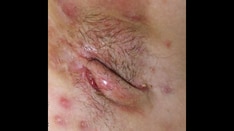Key presentations on hidradenitis suppurativa (HS) at the American Academy of Dermatology 2025 Annual Meeting include studies on the HS patients' risk for cardiovascular disease (CVD) and new-onset inflammatory arthropathies, the impact of biologics on HS-related emergency department (ED) visits, and advice on optimizing HS therapies, as reported by Dr Jennifer Hsiao from the University of Southern California, Los Angeles.
Dr Hsiao starts with a discussion of a group of studies analyzing the TriNetX global database of clinical patient data. The first examined the risk for CVD among HS patients vs age-matched controls; it found HS patients to have significantly elevated levels of markers for systemic inflammation and CVD, but those odds were decreased for patients with HS who were on biologic treatment.
She next discusses a database analysis that examined the impact of biologic treatments on HS-related ED visits. This study found that patients in the biologic cohort lowered their absolute risk for ED visits by over 22%.
Dr Hsiao then examines a study of risk for inflammatory arthropathies which compared cohorts from the database of HS patients against a control group of patients with acne vulgaris. It found HS patients to be at increased risk for new-onset inflammatory arthropathies.
Dr Hsiao closes with takeaways from a session devoted to optimizing therapies for HS management, including choosing a first biologic, the impact of comorbidities on therapy choice, and handling multiple treatment failures.













